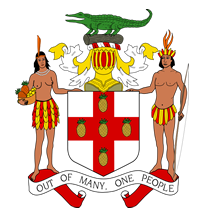The island - discovered by Christopher COLUMBUS in 1494 - was settled by the Spanish early in the 16th century. The native Taino, who had inhabited Jamaica for centuries, were gradually exterminated and replaced by African slaves. England seized the island in 1655 and established a plantation economy based on sugar, cocoa, and coffee. The abolition of slavery in 1834 freed a quarter million slaves, many of whom became small farmers. Jamaica gradually increased its independence from Britain. In 1958 it joined other British Caribbean colonies in forming the Federation of the West Indies. Jamaica gained full independence when it withdrew from the Federation in 1962. Deteriorating economic conditions during the 1970s led to recurrent violence as rival gangs affiliated with the major political parties evolved into powerful organized crime networks involved in international drug smuggling and money laundering. Violent crime, drug trafficking, and poverty pose significant challenges to the government today. Nonetheless, many rural and resort areas remain relatively safe and contribute substantially to the economy.
Jamaica is a parliamentary democracy under a constitutional monarchy and part of the Commonwealth realm.
Members:
Resources
Displaying 26 - 30 of 77Partition Act (Increase in Jurisdiction of Resident Magistrates) Order, 20l3.
This Order amends the Partition Act in section 14(1) so as to amend the monetary jurisdictional level of Resident Magistrates Courts. Section 14 defines jurisdiction that may be exercised by any Resident Magistrate’s Court. Such jurisdiction is limited by a maximum amount of the value of the property in question.
Amends: Partition Act. (2001)
Crown Property (Vesting) (Amendment) Act, 2013 (No. 23 of 2013).
This Act amends the Crown Property (Vesting) Act so as to establish a National Divestment Committee to advise Minister responsible for Land and Environment. It also empowers the Minister making a divestment Order to exempt certain categories of divestment being routed through the newly established Committee.
Amends: Crown Property (Vesting) Act. (1973)
Settled Land Act (Increase in Jurisdiction of Resident Magistrates) Order, 2013.
This Order amends the Settled Land Act in section 54(8) so as to amend the monetary jurisdictional level of Resident Magistrates Courts. Section 54 defines jurisdiction that may be exercised by any Resident Magistrate’s Court. Such jurisdiction is limited by a maximum amount of the value of land, capital money or personal chattels to be dealt with in the Court.
Amends: Settled Land Act. (1997)
Lands Clauses Act (Increase in Jurisdiction of Resident Magistrates) Order, 2013.
This Order amends the Lands Clauses Act in section 98 so as to amend the monetary jurisdictional level of Resident Magistrates Courts. Section 98 allows the jurisdiction given by this Act to the Supreme Court and to a Judge thereof in respect of money paid into the Treasury under this Act, to be exercised by any Resident Magistrate’s Court if such money does not exceed a specified amount.
Amends: Lands Clauses Act. (1997)
Registration (Strata Titles) (Amendment) Act, 2013 (No. 34 of 2013).
This Act amends the Registration (Strata Titles) Act. It, among other things, replacing in section 4 the words "corporation" with "commission". Section 4 concerns the corporation to be constituted by strata lot owners.


